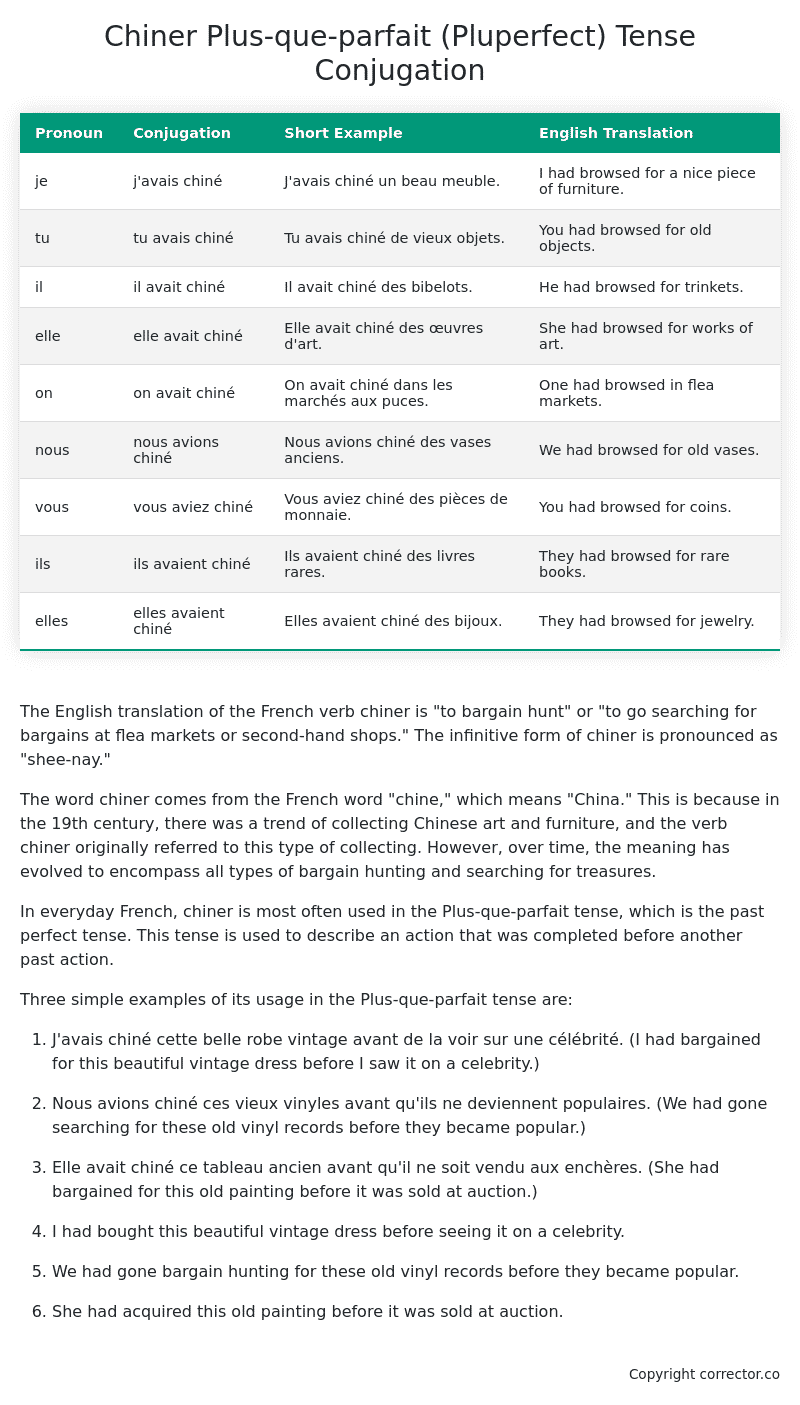Plus-que-parfait (Pluperfect) Tense Conjugation of the French Verb chiner
Introduction to the verb chiner
The English translation of the French verb chiner is “to bargain hunt” or “to go searching for bargains at flea markets or second-hand shops.” The infinitive form of chiner is pronounced as “shee-nay.”
The word chiner comes from the French word “chine,” which means “China.” This is because in the 19th century, there was a trend of collecting Chinese art and furniture, and the verb chiner originally referred to this type of collecting. However, over time, the meaning has evolved to encompass all types of bargain hunting and searching for treasures.
In everyday French, chiner is most often used in the Plus-que-parfait tense, which is the past perfect tense. This tense is used to describe an action that was completed before another past action.
Three simple examples of its usage in the Plus-que-parfait tense are:
-
J’avais chiné cette belle robe vintage avant de la voir sur une célébrité. (I had bargained for this beautiful vintage dress before I saw it on a celebrity.)
-
Nous avions chiné ces vieux vinyles avant qu’ils ne deviennent populaires. (We had gone searching for these old vinyl records before they became popular.)
-
Elle avait chiné ce tableau ancien avant qu’il ne soit vendu aux enchères. (She had bargained for this old painting before it was sold at auction.)
-
I had bought this beautiful vintage dress before seeing it on a celebrity.
-
We had gone bargain hunting for these old vinyl records before they became popular.
-
She had acquired this old painting before it was sold at auction.
Table of the Plus-que-parfait (Pluperfect) Tense Conjugation of chiner
| Pronoun | Conjugation | Short Example | English Translation |
|---|---|---|---|
| je | j’avais chiné | J’avais chiné un beau meuble. | I had browsed for a nice piece of furniture. |
| tu | tu avais chiné | Tu avais chiné de vieux objets. | You had browsed for old objects. |
| il | il avait chiné | Il avait chiné des bibelots. | He had browsed for trinkets. |
| elle | elle avait chiné | Elle avait chiné des œuvres d’art. | She had browsed for works of art. |
| on | on avait chiné | On avait chiné dans les marchés aux puces. | One had browsed in flea markets. |
| nous | nous avions chiné | Nous avions chiné des vases anciens. | We had browsed for old vases. |
| vous | vous aviez chiné | Vous aviez chiné des pièces de monnaie. | You had browsed for coins. |
| ils | ils avaient chiné | Ils avaient chiné des livres rares. | They had browsed for rare books. |
| elles | elles avaient chiné | Elles avaient chiné des bijoux. | They had browsed for jewelry. |
Other Conjugations for Chiner.
Le Present (Present Tense) Conjugation of the French Verb chiner
Imparfait (Imperfect) Tense Conjugation of the French Verb chiner
Passé Simple (Simple Past) Tense Conjugation of the French Verb chiner
Passé Composé (Present Perfect) Tense Conjugation of the French Verb chiner
Futur Simple (Simple Future) Tense Conjugation of the French Verb chiner
Futur Proche (Near Future) Tense Conjugation of the French Verb chiner
Plus-que-parfait (Pluperfect) Tense Conjugation of the French Verb chiner (this article)
Passé Antérieur (Past Anterior) Tense Conjugation of the French Verb chiner
Futur Antérieur (Future Anterior) Tense Conjugation of the French Verb chiner
Subjonctif Présent (Subjunctive Present) Tense Conjugation of the French Verb chiner
Subjonctif Passé (Subjunctive Past) Tense Conjugation of the French Verb chiner
Subjonctif Imparfait (Subjunctive Imperfect) Tense Conjugation of the French Verb chiner
Subjonctif Plus-que-parfait (Subjunctive Pluperfect) Tense Conjugation of the French Verb chiner
Conditionnel Présent (Conditional Present) Tense Conjugation of the French Verb chiner
Conditionnel Passé (Conditional Past) Tense Conjugation of the French Verb chiner
L’impératif Présent (Imperative Present) Tense Conjugation of the French Verb chiner
L’infinitif Présent (Infinitive Present) Tense Conjugation of the French Verb chiner
Struggling with French verbs or the language in general? Why not use our free French Grammar Checker – no registration required!
Get a FREE Download Study Sheet of this Conjugation 🔥
Simply right click the image below, click “save image” and get your free reference for the chiner Plus-que-parfait tense conjugation!

Chiner – About the French Plus-que-parfait (Pluperfect) Tense
Tense Formation
Common everyday usage patterns
Sequencing of past events
Background information
Hypothetical or reported speech
Interactions with other tenses
Summary
I hope you enjoyed this article on the verb chiner. Still in a learning mood? Check out another TOTALLY random French verb conjugation!


